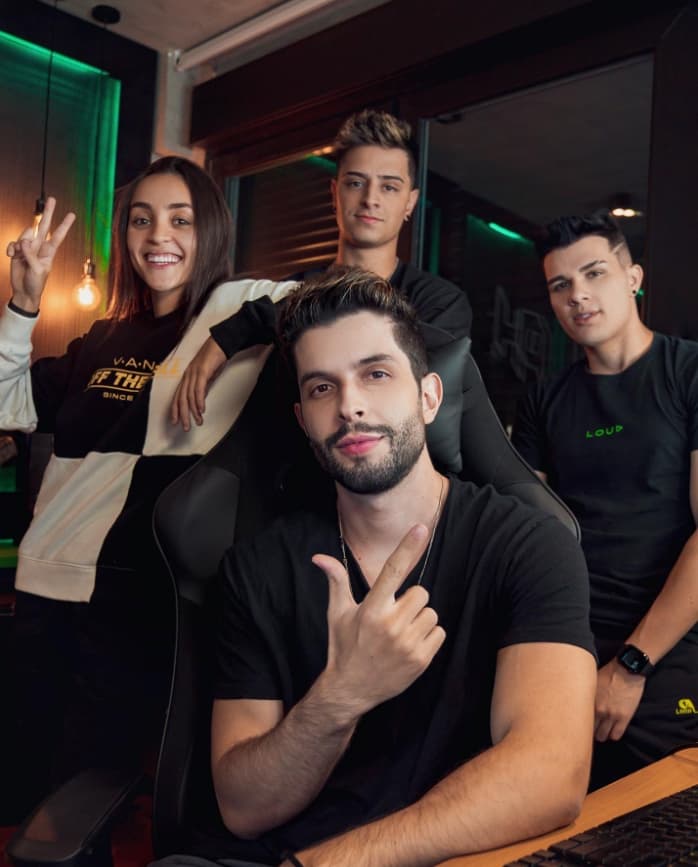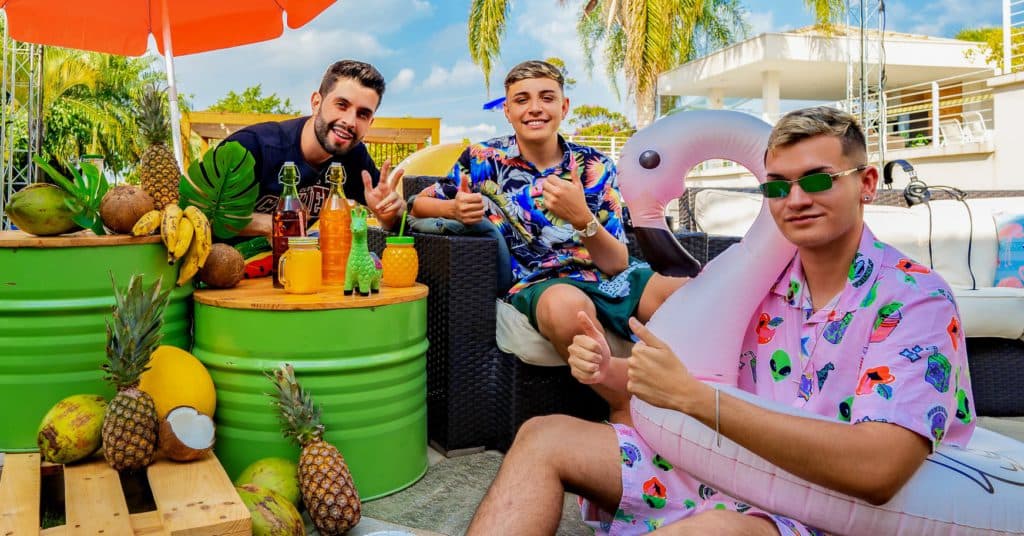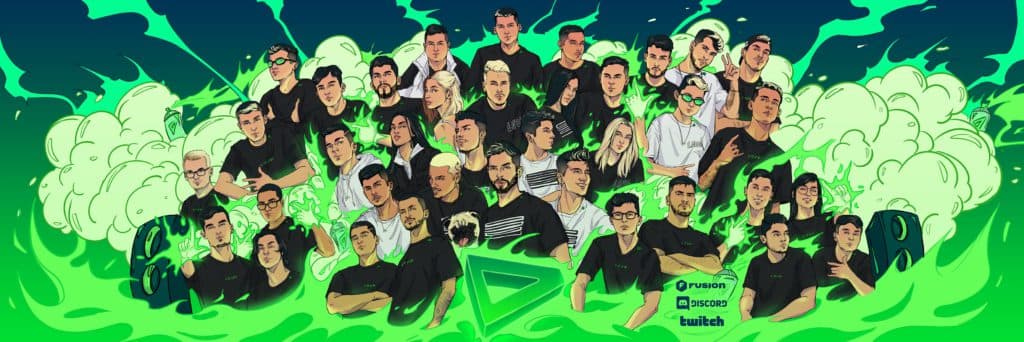LOUD was the first esports organisation to reach a billion views on YouTube and its approach to talent acquisition and content creation is making it a market leader. We spoke to its CEO and founder Bruno “Playhard” Bittencourt about its meteoric rise.
If you asked a typical esports fan which org has the biggest YouTube channel, many might say 100 Thieves or FaZe Clan, but they would be mistaken. In fact, Brazilian-based organisation LOUD has smashed all the records. LOUD was the first esports organisation to reach 1 billion views on YouTube and now are just whiskers away from passing 2 billion. The figures are even more mind-blowing if you consider LOUD only launched the channel in 2019 and currently have 11.6 million subscribers. Their presence on other social media outlets is similarly impressive. 10 million followers on Instagram and just short of 1 million on Twitter and growing.
So what is LOUD? LOUD is a gaming and lifestyle company founded in 2019. Spotting the immense potential for mobile gaming in Brazil - especially with the rise of Free Fire at the time - Bruno Bittencourt and LOUD Co-Founder Jean Ortega founded the LOUD organisation, with content production a top priority from the beginning.
According to Datareportal, in January 2021, the number of social media users in Brazil was equivalent to 70.3% of the total population, one of the highest percentages worldwide. As a result, Brazilians are high consumers of digital content, particularly through mobile. With mobile gaming far more accessible than PC gaming in Brazil, LOUD was able to bring a wealth of engaging content to a vast audience. To support their content goal LOUD recruited young talent, "with a mission to grow competitive talent into digital celebrities".
We spoke to LOUD's CEO and founder Bruno Bittencourt about the intricacies of their business model, and how its has revolutionised the esports space. LOUD's successful approach to growing instead of buying talent has begun to rub off on other top flight orgs, who are now looking to scout the stars of tomorrow today.

Malystryx: LOUD uses a different business model to the likes of other lifestyle esport orgs such as Faze Clan and 100 Thieves despite often being compared to them. You’ve handpicked talent from relative obscurity and made them into superstars. Almost all your talent followed this path, was this the plan all along for LOUD, or was it off the success of the likes of Thaiga that you realised the power of this model?
Bruno "Playhard" Bittencourt: Our business model since day one was targeted at pain points from our 3 founders' experiences while previously working as game developers, publisher, agency, and as content creators. It was crucial for us to figure better ways to scale and streamline the creator process, allowing for talents to focus on what they do best while also becoming this bridge between their business and the needs of publishers and marketers. In order to do this we had to figure out a sustainable way that becomes a win-win situation for all parties and we saw no value-add by leasing large talents in order to monetize, we knew that it wasn’t worth it from an advertisers standpoint and would force our brand into “selling out” which is counterproductive to our goals at building the largest gaming community we can. The true value in LOUD is our commitment to working with talents at an early stage to provide them the right foundation in which they can build their careers and later on their own businesses.
Malystryx: You have become pioneers in the space and many orgs are looking to replicate what you’re doing. However, being able to spy talent and successfully predict their potential is not an easy skill to copy. LOUD’s success rate however, is incredibly high. What are the characteristics or personality traits you look for in a potential talent? How does someone catch LOUD’s attention?
Bruno "Playhard" Bittencourt: Competition is always going to be cutthroat and that’s just how all industries are. We are conscious to not be distracted by competition in our pursuit and instead to innovate as we’ve noticed imitation only dilutes an industry’s profits and prevents an ecosystem from evolving. We have a north star and for the next few years and we will obsess over these goals, so long as we are paving our own way it doesn’t matter what our competitors do. When looking at characteristics and personality traits we have somewhat evolved since we first started.
"Without the right criteria we would just be growing talents that are prone to poaching due to greed and it’s crucial that we are investing into long term prospects from the start."
In addition to raw talent and a good personality we now make sure that having the right mindset heavily affects a lot of the culture within our company. Without the right criteria we would just be growing talents that are prone to poaching due to greed and it’s crucial that we are investing into long term prospects from the start. We want to be able to build large businesses around our brand and for each individual talent and this requires a steadfast mentality that can see the long term returns.
Malystryx: Typically esports orgs once they reach a certain size instead of growing talent, they simply buy established talent for a quicker turnaround. However LOUD still isn’t doing that despite being about to reach 2 billion views on YouTube, a feat not even orgs who have had their YouTube for a decade have come close to.
On reflection I was thinking one reason for this could be that fans grow a much stronger bond to a talent if they are with them through their rise, one that can not be “bought” by bringing in an experienced talent. Another reason I considered was it allows LOUD to stay in touch with its roots of being accessible to all, that perhaps culturally buying the “finished product” could alienate some fans who can appreciate the rags to riches character arc of your talent. So I was very interested to hear your thoughts. Why have you kept the grassroots approach to recruiting instead of buying talent? Should other orgs follow in your footsteps?
Bruno "Playhard" Bittencourt: A talent that can be bought will only be bought or poached again in the future, and our business model isn’t fundamentally to be an agency while we do offer agency-like services. We want to build and develop IP that we can invest into long term, because who wants to invest into something that can only turn around and lose it’s value a short time later.
Nevertheless this doesn’t give us an entirely defensible moat as money does talk, rather we have to focus on our value-add and ability to incubate new talents and develop their IPs. Another part of this comes to our learnings around creator businesses and a reason why we opted to build from scratch as many existing creators have built their business to varying degrees, from content strategies to production, there are many variables that we would have to adjust in order to reach scale. This becomes incredibly hard as large successful creators have already set up their own infrastructure and most often are hesitant to risk that.

There are many successful top organizations out there that drive huge growth for their talents, for the ones that are still finding their own footing my suggestion would be to first focus on community, it doesn’t matter how many championships you win if you don’t have the community you have nothing. It’s not a surprise that within the last 2 years of LOUD’s existence we’ve done more content than any other team globally, and across every platform available.
"It doesn’t matter how many championships you win if you don’t have the community you have nothing."
Malystryx: You’ve said publicly in the past that LOUD decision to launch in Brazil was a natural choice because of existing partners and follower base. You also said Brazil stands out for being a massive consumer of digital content and for having incredible potential for mobile games - which we have seen with Free Fire. Do you think the incredible success LOUD has had could be replicated in another country or continent by yourselves with the knowledge you have now? Or is the success of LOUD very much to do with the country you chose to launch in (Brazil)?
Bruno "Playhard" Bittencourt: Our experience shows that emerging markets require a lot of the infrastructure to support gamers, and it was heeding the calls of gamers in countries like Brazil that had my co-founders looking in the first place. Garena’s Free Fire had a great understanding of these needs and their strategy has only proven to be successful. There are gamers everywhere and of all types, every game has a different community and it’s really understanding the economics of these markets that one is able to thrive. As a company we are indeed ambitious, our bet is that the games industry will only continue to grow, and that everyone will become a creator as we move towards a digital society. Our focus will be on emerging markets and while we can’t share too much, we do hope to be able to position ourselves in major gaming hubs across these markets.

How long is it before Faze Clan is called the American LOUD? Or should it have already happened?
Bruno "Playhard" Bittencourt: Faze Clan have built their community for over a decade now, and have since cultivated one of the most engaged communities in the west. We don’t see Faze as competitors but rather as trendsetters, we do examine both their wins and their learnings in order to better understand things that may or may not work for us. Other teams that we give huge respect to are the folks at Team Liquid and NRG, all of these organizations that continue to innovate and push the boundaries of gaming, esports and lifestyle and have become an inspiration to almost everyone else.
Malystryx: I noticed you have a music video with over 40 million views. We’ve seen bands make tracks for events, for example Imagine Dragons - Warriors for League of Legends Worlds, but I can't think of another org hiring domestic music talent to promote their brand. I’ve also heard you are working towards creating a record label your talents could be a part of. It makes perfect sense thinking about it, but why do you think nobody thought of doing it before? Could you tell us more what LOUD has planned in terms of music?
Bruno "Playhard" Bittencourt: Our approach to music and incubating talent follows a similar methodology to how we launch gaming talents. Due to being a totally separate industry all of our music so far has been R&D, and figuring out what strategy makes the most sense to launch music artists so that they aren’t just a part of the LOUD brand but can grow and succeed in their own right as artists. Once we get rolling a music label makes the most sense, but as of right now it’s seeking out the pain points of the industry so we can offer real value to emerging artists when we enter.
Malystryx: When people launch companies it's common to have a plan a few years in advance. Given the speed LOUD Is growing, have you already completed your plan? What are your long-term goals for LOUD? What is left to conquer?
Bruno "Playhard" Bittencourt: The network effects that can come out from a community is absurd, given the opportunities ahead it’s important for us to pull on the right levers that best correlate with our company. One thing for sure is that in order to continue growing you will have to leverage technology and software, to date we have 3 separate developer teams internally building tools to support our organization’s needs. Externally we’re dipping our toes in several different opportunities, the way I see it is that this market is still in its infancy so our core focus now is to better engage our community, grow our talents and to learn as much as possible. Our ability to see first hand what goes on in this space will only allow us to jump on the billion dollar opportunities as they arise. Imagine what you could do with an awesome product and hundreds of millions of loyal customers.